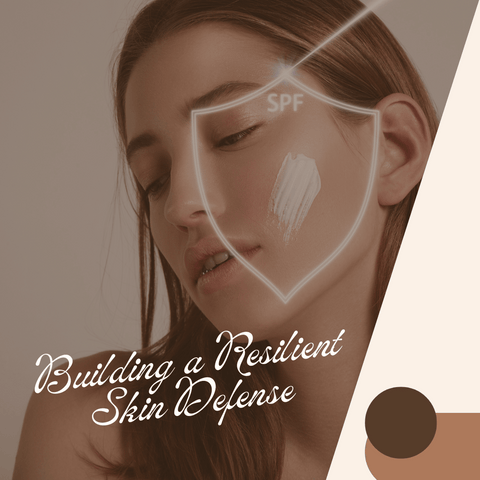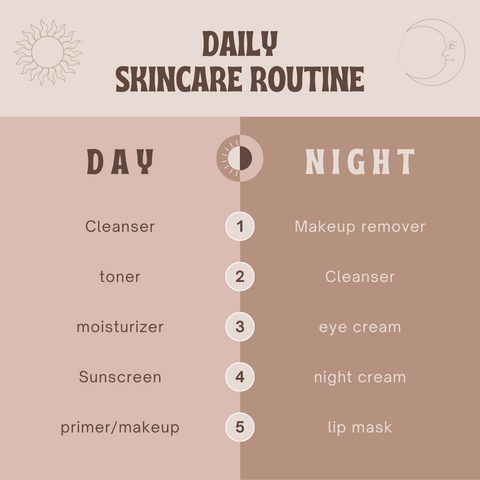Fortifying your skin against environmental assaults is essential to maintaining its health, resilience, and youthful appearance. Pollution, UV radiation, and extreme weather conditions can all harm the skin and hasten the aging process. Sun protection, antioxidants, pollution protection, double cleansing, hydration, barrier repair, humectants, physical protection, antipollution cosmetics, nutrition, staying hydrated, humidifiers, and consulting a dermatologist are all measures to strengthen your skin's defence mechanisms. You may help maintain your skin's strength and resilience in the face of external difficulties by reinforcing it against environmental assaults with a combination of protective measures and the use of proper skincare products.
Unmasking the Invisible Enemies

In the context of skincare, "unmasking the invisible enemies" refers to identifying and resolving the hidden hazards that might affect your skin, frequently without your knowledge. These invisible enemies can include environmental influences, lifestyle decisions, and skincare routines that harm the health and appearance of your skin. Creating a complete skincare routine that targets your skin's specific demands, as well as making lifestyle changes, will assist you in combating these invisible dangers and maintaining vibrant, healthy skin.
The Destructive Power of UV Rays
UV (ultraviolet) rays have a tremendously damaging effect on the skin. The sun emits UV radiation, which has the potential to cause serious skin damage. UV rays that reach the Earth's surface and damage the skin are classified into two types:
-
UVA (Ultraviolet A) Rays: UVA radiation is to blame for premature skin aging. They penetrate deeply into the skin and can cause long-term damage such as wrinkles, fine lines, and loss of elasticity. UVA rays have also been linked to the development of skin malignancies such as melanoma.
-
UVB (Ultraviolet B) Rays: UVB rays predominantly impact the skin's superficial layers. They are the most common cause of sunburn and have been related to the development of skin cancer. UVB rays can also cause the development of age spots and pigmentation problems.
Urban Pollutants: Silent Skin Aggressors
Urban pollution is definitely a silent aggressor that can have a negative impact on the health and appearance of your skin. Living in cities exposes your skin to a variety of pollutants and chemicals, including:
-
Particulate Matter (PM): Particulate Matter (PM) is a term used to describe tiny airborne particles that can settle on your skin, clog pores, and contribute to skin aging.
-
Heavy metals: Pollutants such as lead, mercury, and cadmium can accumulate on the skin's surface, causing inflammation and oxidative stress.
-
Nitrogen Dioxide (NO2): NO2 from vehicle exhaust can cause skin damage, irritation, and premature aging.
-
Ozone at ground level (O3): Ozone is a byproduct of chemical reactions that forms in the atmosphere and can irritate and weaken the skin's barrier.
-
Polycyclic Aromatic Hydrocarbons (PAHs): These toxic compounds found in exhaust fumes and cigarette smoke can adhere to the skin and cause oxidative stress.
-
VOCs (Volatile Organic Compounds): VOCs released by cleaning supplies, cosmetics, and household products can irritate skin and trigger allergic reactions.
Free Radicals: The Underlying Perpetrators
Free radicals are the root cause of many skin problems, including premature aging and skin damage. To grasp their significance and how to properly battle them, you must first understand what free radicals are and how they influence the skin. Free radicals are unpaired electrons in unstable compounds. In an attempt to stabilise themselves, they are highly reactive and can cause damage to other molecules. UV radiation, environmental pollution, tobacco smoke, inflammation, and metabolic reactions are all sources of free radicals.
Building a Resilient Skin Defense

Building a strong skin defence is essential for safeguarding your skin from environmental aggressors, keeping it healthy, and looking young. Cleanse gently, hydrate adequately, sun protection, antioxidants, topical retinoids, a healthy diet, staying hydrated, stress management, sleeping well, avoiding smoking and excessive alcohol, pollution protection, humidifiers, regular skin checks, limiting harsh skincare products, consulting a dermatologist are some tips for boosting your skin's natural defences. You may help protect your skin from environmental aggressors, preserve its strength and resilience, and promote overall skin health by following these steps and personalising your skincare routine to your individual skin type and concerns.
The Role of Antioxidants: Nature's Shields
Antioxidants are nature's defences against environmental aggressors and free radicals, and they play an important role in skincare. These potent ingredients assist in protecting the skin from injury while also maintaining its health and attractiveness. Here's a closer look at antioxidants in skincare:
-
Neutralising Free Radicals: Antioxidants are chemicals that have the ability to neutralise free radicals, which are unstable molecules containing unpaired electrons. Free radicals have the ability to destroy skin cells, proteins, and DNA, resulting in premature aging, skin damage, and an increased risk of skin cancer.
-
Protecting Against Oxidative Stress: An imbalance between free radicals and antioxidants results in oxidative stress, which antioxidants help to prevent in the skin. Antioxidants decrease oxidative stress, which makes skin damage and inflammation less likely to happen.
-
Reducing Signs of Aging: Antioxidants can help to minimise the appearance of wrinkles, fine lines, and age spots. They aid in the preservation of collagen and elastin, which are necessary for skin suppleness and firmness.
-
Evening Skin Tone: Antioxidants can help balance out skin tone and erase dark spots caused by hyperpigmentation or sun exposure.
-
Enhancing Sun Protection: While antioxidants are not a replacement for sunscreen, they can improve its effectiveness. Combining both can provide total UV radiation protection.
-
Strengthening the Skin Barrier: Antioxidants support the skin's natural barrier function, assisting in moisture retention and enhancing resistance to aggressors from the outside.
-
Soothing Irritation: Some antioxidants, such as chamomile and green tea extract, have calming properties that can soothe irritated skin and lessen redness.
-
Promoting Skin Repair: Antioxidants can encourage skin repair mechanisms, which aid in skin healing and renewal.
Sunscreens: Your Primary Line of Defense
Sunscreens are your first line of defence against the harmful effects of UV radiation, making them an essential part of your skincare regimen. Sunscreens protect your skin by blocking UV rays, providing broad-spectrum protection, preventing sunburn, minimising premature aging, lowering skin cancer risk, evening skin tone, supporting skin health, being essential for all skin types and tones, and providing year-round protection. Remember that using sunscreen on a regular basis is an important part of a thorough skincare routine. It provides long-term benefits by shielding your skin from the damaging effects of UV radiation, supporting skin health, and assisting in the maintenance of a youthful complexion.
Nourishing from Within: Boosting Collagen and Elasticity
Maintaining healthy, youthful-looking skin requires increasing collagen and elasticity from within. Collagen and elastin are structural proteins that offer firmness, elasticity, and a smooth texture to your skin. These proteins' production naturally reduces with age, resulting in wrinkles, sagging, and fine lines. Eat a nutrient-rich diet, stay hydrated, get antioxidants, omega-3 fatty acids, collagen-boosting supplements, vitamin C supplements, hyaluronic acid supplements, a protein-rich diet, limit sugar and processed foods, sun protection, stress management, adequate sleep, smoking cessation, avoiding excessive alcohol, and regular exercise are all ways to nourish your skin from within to support collagen and elastin production. Remember that seeing the impact of food and lifestyle changes on your skin takes time.
Curating an Effective Daily Routine

Creating an effective daily skincare routine is essential for maintaining healthy, radiant skin. Here's a step-by-step guide to creating a skincare routine that is right for you:
-
Determine Your Skin Type: Determine your skin type (e.g., oily, dry, combination, sensitive) to select products that are right for you.
-
Cleansing: To remove dirt, makeup, and impurities, use a gentle cleanser. Cleanse your face twice a day, in the morning and at night.
-
Exfoliation: Exfoliate twice a week to remove dead skin cells and improve skin texture. Choose between a chemical exfoliant (such as AHA or BHA) and a gentle physical exfoliant. Exfoliating too much should be avoided.
-
Toning: Use a toner to balance the pH of your skin, hydrate it, and prepare it for subsequent products.
-
Serum: Use a serum to address specific issues such as fine lines, pigmentation, or hydration. Look for serums that contain active ingredients such as vitamin C, hyaluronic acid, or retinol.
-
Moisturise: To hydrate and lock in moisture, use a moisturiser appropriate for your skin type. Apply it in the morning and at night.
-
Sun Protection (Morning Only): Even on cloudy days, apply a broad-spectrum sunscreen with SPF 30 or higher in the morning. If you will be in the sun, reapply.
-
Evening Routine: Focus on repair and rejuvenation in the evening. If you wear makeup or sunscreen, cleanse twice. Begin with an oil-based cleanser, then move on to a water-based cleanser. Any treatment products, such as retinol or specialised serums, should be used. For overnight hydration, apply a richer night cream or moisturiser.
-
Eye Cream (Optional): Use an eye cream to address specific issues such as reduce dark circles or puffiness around the eyes. Use your ring finger to gently apply it.
-
Weekly Treatments (1-2 Times Per Week): Use masks, exfoliants, or hydrating masks to address specific skin concerns.
-
Hydration (As Needed): Drink plenty of water throughout the day to support skin health from within.
-
Specialised Products (As Needed): Incorporate specialised products recommended by a dermatologist if you have specific skin concerns (e.g., acne, hyperpigmentation).
Cleansing: Purging Daily Toxins
Cleansing is an important part of your daily skincare routine that extends beyond removing makeup and grime. Cleansing aids in the purification of your skin by removing daily toxins, pollutants, and impurities that accumulate on its surface. This is how cleansing helps in the process:
-
Removing Surface Impurities: Your skin comes into contact with various pollutants, dirt, and debris from the environment throughout the day. Cleansing aids in the removal of surface impurities, preventing them from clogging your pores and causing skin problems.
-
Makeup Removal: Cleansing effectively removes makeup such as foundation, concealer, and eye products. Leaving makeup on overnight can result in clogged pores and breakouts.
-
Unclogging Pores: Cleansing aids in the unclogging of pores by removing excess oil and sebum that can build up throughout the day. Clogged pores are a haven for acne-causing bacteria.
-
Rebalancing pH Levels: Proper cleansing aids in the maintenance of the skin's natural pH level, which is necessary for healthy skin function. A pH imbalance can cause dryness, sensitivity, and other skin problems.
-
Skin Preparation: Clean skin serves as a blank canvas for subsequent skincare products such as serums, moisturisers, and treatments. These products are more effective when applied to clean skin.
-
Promoting Skin Health: By eliminating daily toxins and impurities, cleansing helps to maintain the overall health of the skin and wards off common problems like dullness, acne, and early aging.
Hydrating and Moisturising: Reinforcing the Barrier
Hydrating and moisturising are important elements in your skincare routine since they help build the skin's barrier and keep it healthy and robust. Here's why these steps matter and how they help the skin's barrier function:
-
Hydrating the Skin:
-
Hydration refers to the amount of water in your skin cells. Proper hydration is essential for skin health and function.
-
Dehydrated skin can cause a variety of problems, including dryness, tightness, flakiness, and an impaired barrier.
-
Hydrating products, such as toners and hydrating serums, contain ingredients that attract and retain moisture in the skin, such as hyaluronic acid, glycerin, and ceramides.
-
By keeping your skin hydrated, you help it function properly, improve its overall appearance, and improve its ability to defend against environmental stressors.
-
Moisturising the Skin:
-
Moisturising involves sealing in moisture to prevent it from evaporating from the skin's surface.
-
Moisturisers are available in creams, lotions, and oils, and are formulated with emollients (such as oils and butters) and occlusives (such as waxes) to form a protective barrier on the skin.
-
Moisturisers help to keep the skin's surface smooth and soft by locking in moisture and preventing water loss.
-
They also serve as a barrier against external aggressors such as pollutants and irritants, aiding in the maintenance of skin health.
-
Reinforcing the Skin Barrier:
-
The skin barrier, also known as the stratum corneum, is the skin's outermost layer. It acts as a barrier against outside influences.
-
A healthy skin barrier is critical for preventing moisture loss, keeping harmful microorganisms out, and maintaining skin health.
-
Hydration and moisturization work in tandem to strengthen the skin barrier. Hydrating the skin ensures that it has enough water to function properly, whereas moisturising seals in moisture and strengthens the barrier's integrity.
Nighttime Rituals: Healing and Repairing
Nighttime skincare regimens are essential for healing, restoring, and revitalising your skin as you sleep. During the night, your skin is more responsive to active substances and undergoes natural regeneration processes. Here's how to optimise your bedtime routine for the best results:
-
Double Cleansing: Begin by removing makeup, sunscreen, and the day's impurities with an oil-based cleanser. To deep-cleanse your skin without stripping it, use a gentle, water-based cleanser.
-
Exfoliation (2-3 times per week): If exfoliation is a part of your routine, do it at night to remove dead skin cells and allow active ingredients to penetrate more effectively. Excessive exfoliation can cause irritation and disrupt the skin barrier.
-
Hydrating Toner: Use a hydrating or soothing toner to balance the pH of your skin and prepare it for the next products.
-
Active Serums or Treatments: Use serums or treatments that target your specific concerns, such as retinoids for anti-aging, niacinamide for texture, or vitamin C for brightness. These active ingredients are more effective at night when your skin is in repair mode.
-
Eye Cream: Use an eye cream to treat issues such as fine lines, dark circles, and puffiness. Use gentle, tapping motions with your ring finger.
-
Moisturise: Select a moisturiser that is appropriate for your skin type and concerns. A richer night cream can offer additional hydration and nourishment. Moisturising at night aids in moisture retention and supports the skin's natural repair processes.
-
Overnight Masks or Treatments (1-2 Times Per Week): Use overnight masks or treatments for additional hydration, repair, or targeted treatment of specific issues.
-
Lip Care: To keep your lips soft and moisturised, use a hydrating lip balm or treatment.
-
Hands and Neck: Include anti-aging and moisturising products in your skincare routine for your neck and hands.
-
Comfortable Sleep Environment: Ensure that you have a comfortable sleeping environment, including a clean pillowcase and, if necessary, a humidifier to maintain optimal indoor humidity levels.
-
Consistency: Consistency is essential for long-term results. Maintain your nighttime routine on a consistent basis.
-
Relaxation and Stress Reduction: Relax before going to bed to reduce stress, which can have an impact on skin health. Meditation, reading, or soaking in a warm bath can all be beneficial.
-
Sleep: Ideally, you should get 7-9 hours of quality sleep each night to allow your skin to repair and regenerate.
-
Consult a Dermatologist: If you have specific skin concerns, see a dermatologist for tailored nighttime skincare recommendations and treatments.
Your nighttime skincare routine is an important component of your overall skincare routine. It allows your skin to repair, heal, and rejuvenate, resulting in a refreshed and revitalised complexion when you wake up. For the best results, tailor your nighttime routine to your specific skin type and concerns.
Taking a Step Beyond: Advanced Protective Measures

Advanced skincare protection goes beyond the fundamentals, involving additional steps and products to address specific conditions or optimise skin health. These strategies can assist you in achieving more advanced skincare objectives. Antioxidant serums, retinoids (retinol or prescription-strength), peptide-based products, growth factors, targeted spot treatments, sunscreen with high SPF and PA ratings, physical sunscreens, barrier repair products, professional treatments, customised skincare regimens, dermatologist consultation, and internal wellness are some advanced protective measures to consider. These steps necessitate a careful evaluation of your skin type, concerns, and goals, as well as consultation with skincare experts for personalised advice and treatments.
































